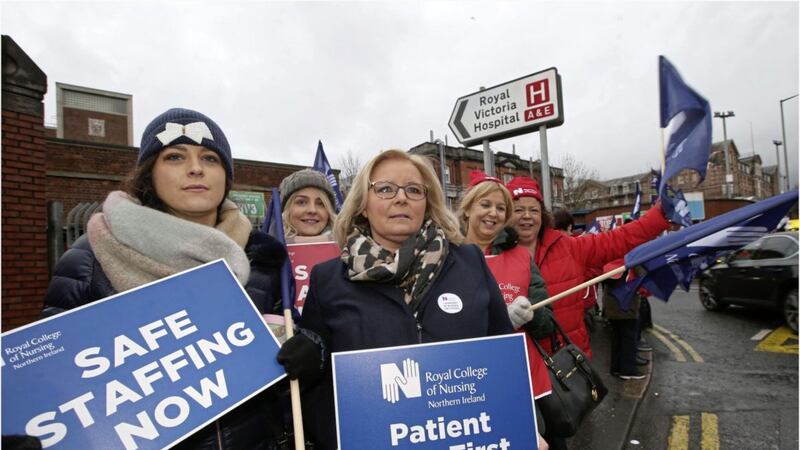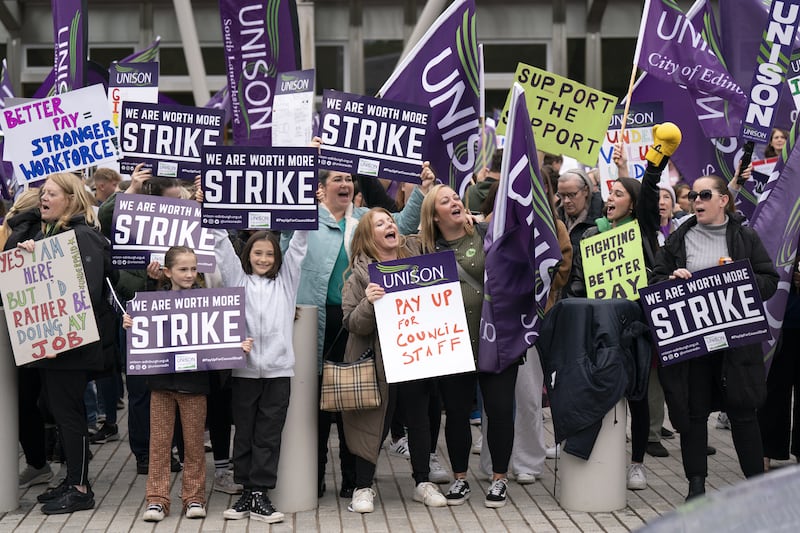Healthcare unions Unison and the Royal College of Nursing (RCN) have suspended strike action following talks with the Department of Health.
Extra money for salary parity with England and promises on safe staffing levels have been provided by Health Minister Robin Swann.
The British government has meanwhile been accused of "penny pinching" after its financial settlement underpinning the Stormont deal fell short of some expectations.
Speaking at a press conference at Parliament Buildings, this afternoon, Mr Swann said: "It's very welcome from the Department of Health's point of view because now we have got that reassurance from the unions, hopefully we can avoid industrial action next week and I think that's what we have all been working to, unions as well as the Department of Health, because there is no-one within that health and social care sector that I believe wanted to be on strike.
"It's a welcome statement we have today and support from the unions that we can get back to work."
Mr Swann said the additional pay should be received by health workers by March.
"We're hopeful that we can move to the facilitation of the distribution of that money, we're potentially looking March, possibly April, but it will be as soon as we can possibly get it into their pockets. That's about showing the genuine good will we have in addressing that need of pay parity," he said.
Asked whether workers could be reimbursed for money lost during strike action, Mr Swann responded: "I don't think that is going to be possible from a legal point of view. I know it has been raised, it was raised in the chamber earlier this week with me, and it was raised by some trade unions, but in regards to what my belief is, I don't think that's possible."
The Royal College of Nursing's Northern Ireland director Pat Cullen said: "The progress this week is testament to having political leadership in place following three years of standing still."
@RCN_NI Director @patcullen9 says she’s delighted with the progress made this week to try and restore pay parity and safer staffing levels for nurses. The union has suspended strike action and will consult members on the latest framework agreement from Stormont ministers. pic.twitter.com/Sgsm9EijNi
— Q Radio News (@qnewsdesk) January 16, 2020
Thousands of nurses took three days of strike action this year and last, which paralysed parts of the NHS and led to the cancellation of many medical appointments and delays to operations.
Mr Swann pledged an extra £30 million from within existing resources this year in a bid to end the industrial action.
Ms Cullen said: "This has been a long and difficult road for nurses in Northern Ireland but following the unprecedented decision to take strike action, our members finally have something concrete to consider in relation to both the restoration of pay parity and safe staffing."
Unison's Regional Secretary Patricia McKeown said: "We believe that we will have a positive response from our members.
"We are determined to get back to the core business of tending to the health needs of our people.
"This time we expect to be listened to and to play a full role in re-building our health service for the future.”
Secretary of State Julian Smith said it was the best financial deal of any Northern Ireland talks settlement and worth £2 billion once extra money for UK regions from central government actions is included.
"We then have the annual budget in March, the UK Budget, and we have a deal for Brexit," he said.
"So the key task for this Executive now is to focus on its priorities."
Mr Smith said the Stormont parties have agreed to publish the "fuller details of an agreed programme for government" within two weeks of the restoration of the institutions.
He added: "This government stands ready over the coming months and years to work with the executive, we really want to support it, but £2 billion of money now is an extremely good start and I'm confident that is the basis for a strong future for Northern Ireland."
Sinn Féin Finance Minister Conor Murphy said the extra £1 billion from the Treasury to support restored devolution was an act of bad faith and fell short of what was necessary to fulfil commitments in the agreement.
It included "a rapid injection of £550 million to put the executive's finances on a sustainable footing", the Northern Ireland Office (NIO) said, including £200 million to end the nurses' dispute.
The British government said the package will be accompanied by "stringent" conditions contained within the Stormont deal, around accountability for public spending and the development of sustainable public services.
ormer Ulster Unionist leader Mike Nesbitt said it was hard not to view the British government's actions on money as payback.
He said: "Payback from the Conservative Party to the DUP for the way they treated them when they had the balance of power at Westminster and also payback from the Treasury, who I think are sick of the kind of fill your boots attitude that some people here demonstrate when it comes to Treasury money outside of the bloc grant."
He added: "I would also encourage the five parties of the executive to stick together, to stay collegiate and to make a plan to go back and ask for more money, not with a begging bowl but to make the case that what we need to do is transformation as well as dealing with the short-term issues."








